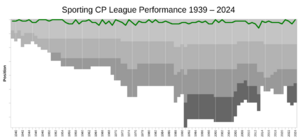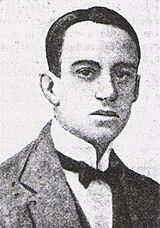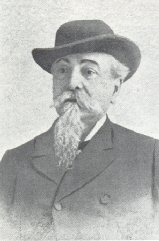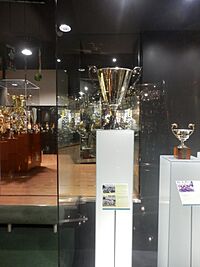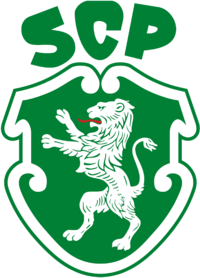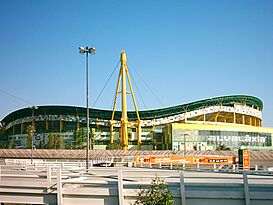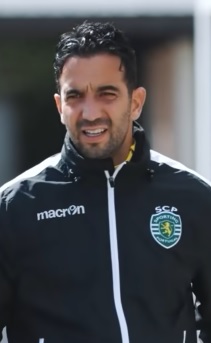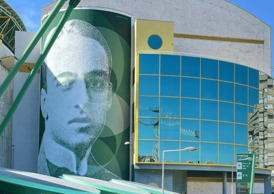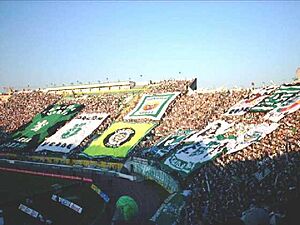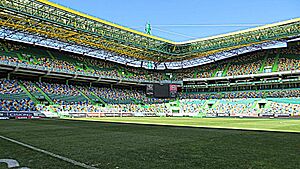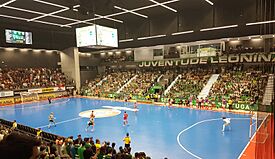Sporting CP facts for kids
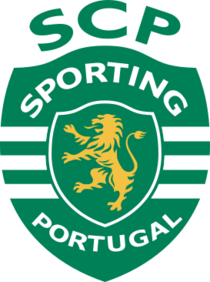 |
||||
| Full name | Sporting Clube de Portugal | |||
|---|---|---|---|---|
| Nickname(s) |
|
|||
| Short name | Sporting Lisbon | |||
| Founded | 1 July 1906 | |||
| Ground | Estádio José Alvalade | |||
| Capacity | 50,095 | |||
| President | Frederico Varandas | |||
| Head coach | Rui Borges | |||
| League | Primeira Liga | |||
| 2024–25 | Primeira Liga, 1st of 18 (champions) | |||
|
||||
Sporting Clube de Portugal, often called Sporting CP or just Sporting, is a famous Portuguese sports club from Lisbon. While it has many different sports teams, it's most known for its men's professional football (soccer) team. This team plays in the Primeira Liga, which is the top football league in Portugal.
Sporting was started on July 1, 1906. It's one of the "Big Three" clubs in Portugal, meaning it's one of the biggest and most successful. Along with its rivals Benfica and Porto, Sporting has never been relegated from the Primeira Liga. The club's nicknames are Leões (Lions), because of the lion on their badge, and Verde e Brancos (Green and Whites), for their striped shirts. Their song is "A Marcha do Sporting" ("Sporting's March"), and their motto is Esforço, Dedicação, Devoção e Glória (Effort, Dedication, Devotion and Glory). Fans are called sportinguistas, and the club's mascot is Jubas. Sporting is one of the world's largest sports clubs by membership, with about 150,000 members.
Sporting's home stadium is the Estádio José Alvalade, built in 2003. Before that, they played in an older stadium built in 1956. The club also has an indoor arena called Pavilhão João Rocha. Sporting is famous for its youth academy, which has helped train amazing footballers like Luís Figo and Cristiano Ronaldo.
Sporting is the third most successful Portuguese football team, with 56 major trophies. They have won 21 League titles, 18 Portuguese Cups, 4 Campeonato de Portugal titles, 4 League Cups, and 9 Super Cups. In Europe, they won the 1963–64 European Cup Winners' Cup and were runners-up in the UEFA Cup in 2005. Sporting played in the very first European Champions Cup match on September 4, 1955. They have also played in the most editions of the UEFA Cup/UEFA Europa League (36 times).
Contents
Club History: Sporting's Journey
How Sporting CP Started (1902–1906)
Sporting Clube de Portugal began in June 1902. A group of young men, including Francisco and José Maria Gavazzo, started a club called Sport Club de Belas. This club didn't last long. Two years later, the idea of a football club came back. The Gavazzo brothers joined José Alvalade and José Stromp to create the Campo Grande Football Club. They played on land owned by José Alvalade's grandfather, the Viscount of Alvalade.
The club was active in sports like football, tennis, and fencing. They also organized social events. However, in April 1906, some members wanted the club to focus only on social events, while others wanted it to be about sports. José Gavazzo, José Alvalade, and 17 others left. José Alvalade said, "I'll go to my grandad and he'll give me money to make another club."
So, a new club was founded on May 8, 1906. On May 26, it was named "Campo Grande Sporting Clube". The Viscount of Alvalade, who provided money and land, became Sporting's first president. José Alvalade, one of the main founders, said, "We want this club to be a great club, as great as the greatest in Europe." On July 1, 1906, the name Sporting Clube de Portugal was suggested, and this date is now celebrated as the club's founding day.
Early Years and First Wins (1907–1946)
The year 1907 was important for Sporting. On February 3, they played their first football match, losing 5–1. On July 4, they opened their first sports ground, "Sítio das Mouras", which was very modern for its time with showers, tennis courts, and a football field. On December 1, they played their first derby match against local rivals S.L. Benfica (then called Grupo Sport Lisboa). By 1909, the club offered many sports, including football, athletics, gymnastics, tennis, and cricket.
In 1922, Sporting released its first report card, "Boletim do Sporting", which later became "Jornal do Sporting", the club's official newspaper. Sporting played its first Primeira Liga game on January 20, 1935, winning 6–0. In 1941, under manager József Szabó, Sporting won its first league title.
Golden Era and European Success (1946–1982)
Sporting's football team was at its best in the 1940s and 1950s. A famous group of players, nicknamed "The Five Violins" (including Fernando Peyroteo, José Travassos, Albano Pereira, Jesus Correia, and Manuel Vasques), led the team. With their help, Sporting won seven league titles in eight seasons between 1947 and 1954, including four in a row. Fernando Peyroteo is considered one of Portugal's greatest players ever.
On September 4, 1955, Sporting and Yugoslavian team Partizan made history by playing the first-ever UEFA Champion Clubs' Cup match. Sporting's player João Martins scored the first goal in the competition. The match ended in a 3–3 draw. Sporting also opened its new stadium, José Alvalade Stadium, on June 10, 1956, which was their home until 2003.
In the 1960s, Sporting achieved European success. They won the 1963–64 European Cup Winners' Cup by beating MTK Budapest from Hungary in the final. This was the only time a Portuguese team won this trophy. On their way to the final, they had a record-breaking 16–1 win against APOEL. They also made a great comeback against Manchester United, winning 5–0 at home after losing 4–1 away. The winning goal in the final was scored by João Morais directly from a corner kick.
Challenges and New Beginnings (1982–2002)
In 1981, English manager Malcolm Allison helped Sporting win both the league title and the Portuguese Cup in 1982. After this, Sporting went through a period without winning many titles until 2000. However, they did win the Portuguese Super Cup in 1987 and the Portuguese Cup in 1995. A memorable moment was a 7–1 victory over rivals Benfica on December 14, 1986. Sporting also reached the UEFA Cup semi-final in 1991.
In 2000, Sporting, led by manager Augusto Inácio, won the league title after 18 years. The next season, they won the 2000 Super Cup. In the 2001–02 season, with coach László Bölöni, Sporting won their 18th league title, the Portuguese Cup, and the 2002 Portuguese Super Cup. On June 21, 2002, the club opened its training facility in Alcochete, near Lisbon.
On August 14, 2002, a 17-year-old Cristiano Ronaldo played his first official match for Sporting's senior team.
Modern Era and Recent Success (2002–Present)
Sporting opened its new stadium, the Estádio José Alvalade, on August 6, 2003. In the 2004–05 season, Sporting reached the 2005 UEFA Cup Final at their home stadium but lost 3–1 to CSKA Moscow.
Domestically, Sporting won the Portuguese Cup in 2007 and 2008. They also reached the knockout stage of the UEFA Champions League for the first time in the 2008–09 season. In 2012, they almost reached another European final in the Europa League, but were stopped in the semi-finals.
After some difficult years, Bruno de Carvalho was elected president in 2013. In the 2014–15 season, Sporting won their 16th Portuguese Cup in a very exciting final against Braga. They were losing 2–0 at halftime but came back to win 3–1 on penalties. This was their first trophy in seven years.

In 2015, Jorge Jesus became Sporting's coach. Under him, Sporting won the Portuguese Super Cup in 2015. In 2018, Sporting won their first League Cup. However, after finishing third in the league, some players and coaches were attacked by a group of supporters at the training ground. Days later, Sporting lost the Portuguese Cup final.
In March 2020, Ruben Amorim became Sporting's manager. In the 2020–21 season, Sporting won their third League Cup and ended a 19-year wait to win the Portuguese league. They secured their 19th Primeira Liga title with only one loss. In the 2021–22 UEFA Champions League, Sporting reached the knockout phase for only the second time. They also won the 2021 Supertaça Cândido de Oliveira and the 2021–22 Taça da Liga. In the 2023–24 season, with star player Viktor Gyökeres, Sporting won their 20th Primeira Liga title.
For the 2024-25 season, Sporting had a great start. Coach Ruben Amorim left to join Manchester United. After a short period with another coach, Rui Borges took over. He led Sporting to win the Primeira Liga for their 21st title, marking their first back-to-back win in over 71 years. This shows Sporting's growing strength in Portuguese football. Viktor Gyökeres was the top scorer with 39 goals in 33 league games.
Club Identity: Motto, Crests, Kits, and Mascot
Club Motto
Sporting CP's motto is: "Effort, Dedication, Devotion and Glory" (Esforço, Dedicação, Devoção e Glória).
Club Crests
The lion on Sporting's crest was inspired by the heraldry of Dom Fernando de Castello-Branco. The club's emblem has changed over time, but the lion, the color green, and the club's name (Sporting Clube de Portugal) or its initials (SCP) have always been there. Sporting has had five main emblems, plus two special ones for its 50th and 100th anniversaries.
In 2001, Sporting changed its emblem to look more modern. The current emblem has a simpler design with green and three white stripes, representing the club's shirt. The words 'Sporting' and 'Portugal' are written in full to show the club's national and international importance. A golden lion is featured, and the letters "SCP" (for Sporting Clube de Portugal) are like a crown on top.
Team Kits
When Sporting was founded in 1906, players wore white jerseys. On October 25, 1908, the club introduced the "Stromp kit," which was half white and half green. It was named after founder Francisco Stromp. This kit was used until 1928. On November 6, 1927, the horizontally striped green and white jerseys, chosen for the rugby team, were first worn by the football team in a friendly match. In July 1928, the football team wore the striped jerseys for a trip to Brazil because they were lighter. On October 5, 1928, during a match against Benfica, the players switched to the striped jerseys at halftime, and these green and white horizontal stripes with black shorts became the club's main kit.
Club Mascot
Sporting's mascot is named Jubas. Jubas is a lion character who wears the team's uniform. He appears at games and events to promote the club and help with charity work.
Club Names
The club's full official name is Sporting Clube de Portugal, which means "Sporting Club of Portugal." UEFA and FIFA often refer to it as "Sporting CP." Some people outside Portugal call it "Sporting Lisbon," but many sportinguistas prefer the official name because it represents the club's identity. The club even updated its crest in 2001 to highlight "Sporting" and "Portugal" in its name.
Sporting CP Supporters
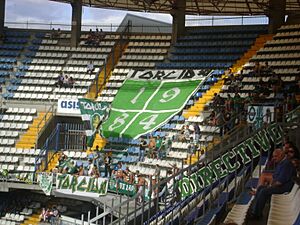
Sporting CP fans are called sportinguistas. The club has about 150,000 official members. Studies suggest that Sporting is the second or third most supported sports club in Portugal, with millions of fans. Sporting also has many fans in other Portuguese-speaking countries and among Portuguese people living abroad.
The club's anthem is "Sporting's March" (A Marcha do Sporting). It was written in 1955. Sporting also has its own version of the song "My Way," called "O Mundo Sabe Que" ("The World Knows That"), which fans sing on match days. Other popular songs include "Só Eu Sei" and "Curva Belíssima."
Throughout its history, Sporting has created many fan clubs and branches (núcleos, filiais e delegações) in Portugal and around the world. Some of these branches, like Sporting Clube de Tomar and Sporting Clube de Lourenço Marques (in Mozambique, where Eusébio started playing), became important sports clubs themselves. These groups help promote and support Sporting CP and often organize social and sporting activities in their local areas.
Club Rivalries
Lisbon Derby: Sporting vs. Benfica
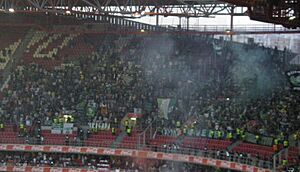
Sporting's biggest rival is Benfica. Their matches are known as the Lisbon derby or "the eternal derby." This rivalry began in 1907 when eight Benfica players moved to Sporting for better training. Sporting won the first derby 2–1. Sporting's biggest win over Benfica was 7–1 in 1986.
The rivalry has seen many dramatic moments. In 1994, Benfica won a crucial match 6–3, which helped them win the league title over Sporting. In the 1996 Portuguese Cup final, a tragic incident occurred when a flare hit and killed a Sporting fan. Later, in 2011, after a loss to Benfica, some Sporting supporters set fire to a stadium stand. These events show the intense passion of the rivalry.
Sporting vs. Porto
Sporting also has a strong rivalry with Porto. This rivalry often represents the difference between Lisbon (where Sporting is) and the North of Portugal (where Porto is). This rivalry has even been featured in Portuguese films.
Sporting and Porto have met in 13 competition finals. Sporting won their first final against Porto in 1978 in the Portuguese Cup. They have also met in the Super Cup and League Cup finals. In 2019, Sporting won the Portuguese Cup against Porto after a penalty shootout. Despite the rivalry, the clubs sometimes work together, as they did in 2017 against Benfica.
Club Facilities
Estádio José Alvalade: Sporting's Home Stadium
Sporting has had several home grounds throughout its history. The first, "Sítio das Mouras", opened in 1907 and was very advanced for its time. Later came the Estádio do Campo Grande (1917–1937) and the Estádio do Lumiar (1937–1956). In 1956, the first Estádio José Alvalade was opened, where Sporting played until 2003.
A new Estádio José Alvalade was built for the UEFA Euro 2004 tournament in Portugal. Designed by Tomás Taveira, it opened on August 6, 2003. The area around the stadium, called Alvalade XXI, includes a shopping mall, cinemas, a health center, offices, residential areas, the club's museum, and official store. The first match at the new stadium was a 3–1 win against Manchester United, which also marked Cristiano Ronaldo's departure from Sporting. The stadium can hold 50,095 spectators. It has hosted important matches, including the 2024–25 UEFA Women's Champions League final. The stadium is currently undergoing renovations to modernize it and add more seats.
Academia Cristiano Ronaldo and Youth Academy
The Cristiano Ronaldo Academy is Sporting CP's main football training center. It's where the professional team trains daily and where young players develop their skills. The academy also houses the club's support staff.
Sporting's youth academy is famous for developing top players like Ballon d'Or winners Luís Figo and Cristiano Ronaldo. At the Euro 2016, 10 out of 14 players in the Portuguese national team's final match came from Sporting's academy. At the 2018 FIFA World Cup, Sporting's academy had the most players (14) in the tournament, more than any other club's youth system.
Pavilhão João Rocha: Indoor Arena
The Pavilhão João Rocha is Sporting CP's indoor sports arena, named after former club president João Rocha. It can hold 3,000 spectators and is the largest indoor arena owned by a sports club in Portugal. It's designed for all indoor team sports and has modern video and multimedia systems.
Around the pavilion, there's a "Walk of Fame" (Passeio da Fama) honoring famous Sporting athletes, coaches, and executives from various sports. Next to the pavilion is the Escola Academia Aurélio Pereira, a youth academy school for younger footballers. The pavilion also has an official club store (Loja Verde) and a branch of the Sporting Museum, focusing on virtual experiences. It's also used for concerts and cultural events.
Club Records and Achievements
Top Goal Scorers in Portuguese League
Sporting players have often been the top goal scorers in the Portuguese League.
|
|
|
- 1Shared award; 2Portuguese record; 3European Golden Shoe
Player of the Year Awards
The Player of the Year award, named after Francisco Stromp, started in 1992.
|
|
|
|
|
Other Player Awards
Many Sporting CP players have won important awards:
- European Golden Boot: Héctor Yazalde (1974), Mário Jardel (2002)
- African Footballer of the Year: Emmanuel Amuneke (1994)
- Swedish Guldbollen: Viktor Gyökeres (2024)
- Portuguese Golden Ball: Luís Figo (1994)
- Portuguese Footballer of the Year: Luís Figo (1995), Mário Jardel (2002)
- LPFP Primeira Liga Player of the Year: Bruno Fernandes (2018, 2019), Sebastián Coates (2021)
- LPFP Primeira Liga Goalkeeper of the Year: Rui Patrício (2012, 2016, 2018), Antonio Adán (2021)
Club Records
- Most appearances: Hilário (474 games)
- Most goals scored: Fernando Peyroteo (526 goals)
- Best goals per game ratio: Fernando Peyroteo (1.62 goals per game)
- Youngest player in a Primeira Liga game: Dário Essugo (16 years and 6 days)
- Youngest player to score on debut: Geovany Quenda (17 years, 3 months and 5 days)
- Highest transfer fee received: Bruno Fernandes (up to 80 million euros)
- Highest transfer fee paid: Viktor Gyokeres (up to 26 million euros)
Club Officials
Current Directive Board
- President: Frederico Varandas
- Vice-presidents: Carlos Vieira, Vicente Moura, Vítor Silva Ferreira, António Rebelo
- Board members: Bruno Mascarenhas Garcia, Luís Roque, Rui Caeiro, Alexandre Henriques, José Quintela
Club Museum
The Sporting Museum (Museu Sporting) opened on August 31, 2004, in Lisbon. It shows off the club's rich history and achievements in many different sports over more than a century. It displays about two thousand trophies, with many more stored away.
The museum's history goes back to the old trophy room in 1956. In 2016, the museum was completely renovated. There is also an official Sporting Museum in the city of Leiria, outside Lisbon.
Sporting Foundation
Sporting CP has always been involved in helping the community. In 2006, they created "Sporting Solidário" (Sporting Solidarity). In 2012, the Fundação Sporting (Sporting Foundation) was established. This foundation is a charity that helps people in need, including children at risk, the homeless, and war victims. Donations are collected on match days, and money from some ticket sales goes to the foundation to support its charity work.
See also
 In Spanish: Sporting de Lisboa para niños
In Spanish: Sporting de Lisboa para niños


